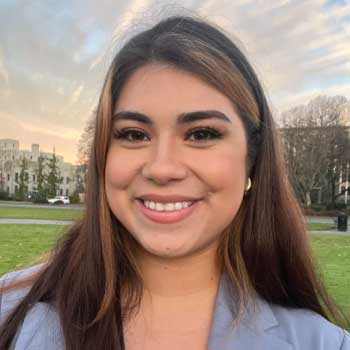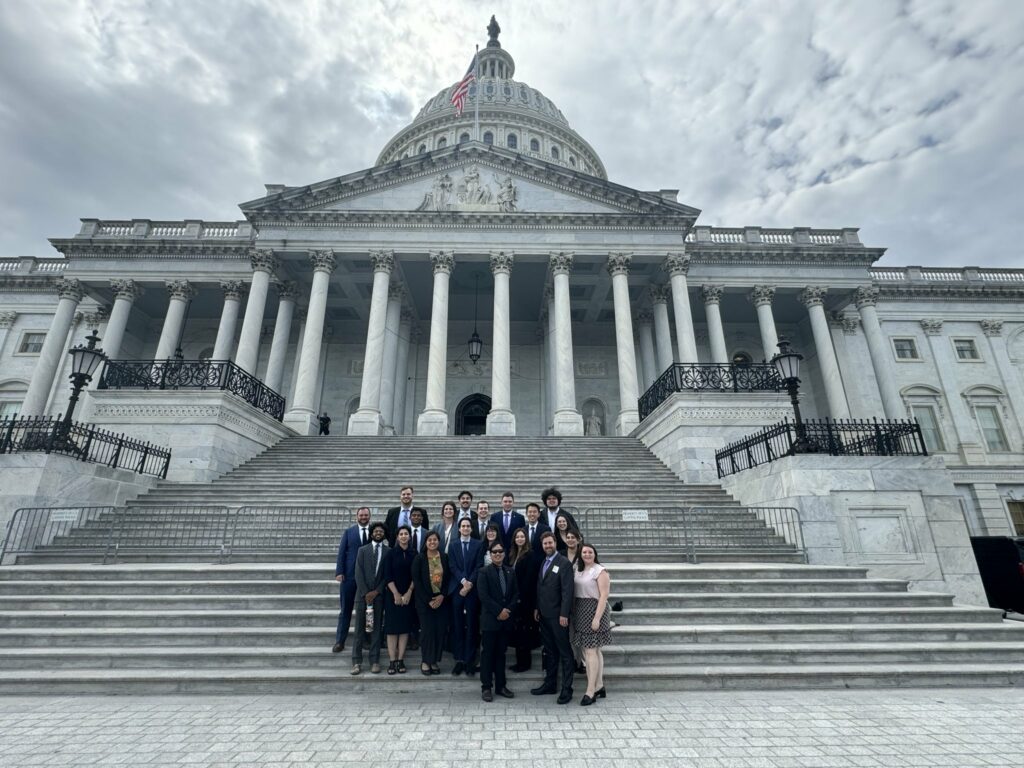

Name and Pronouns: Nancy Canales-Montiel
Graduation Year:
2024
Hometown & Current City of Residence: Lynnwood but currently residing in Olympia
Current Job: Nonprofit leadership and Political Consultant
Title and Employer: Executive Director, WA Student Association
With a passion for civic engagement and a commitment to serving communities, Nancy Canales-Montiel serves as the Executive Director for the Washington Student Association while assisting in curriculum building and teaching at Mi Centro’s civic education program; The Dolores Huerta Institute. Prior to taking on these roles, she served as the Development Coordinator at the Washington State Democratic Party.
Nancy grew up just 20 mins north of Seattle in Lynnwood, with a family of immigrants from Mexico, before attaining degrees in Political Science and Public Policy from Central Washington University. In her personal time, she loves exploring Washington through hikes, road trips, and walks in the park. She enjoys reading and spending time with loved ones.
What led you to join the Institute for a Democratic Future (WAIDF) program and did you choose to participate in WAIDF?
My entire career has been centered around nonprofit development and higher education policy but government systems and their efficacy to address society’s issues is my fascination. I had heard from various friends and colleagues about the program so when I looked further into it, I was excited to hear of programming that allowed me to travel the state, with other people who care about being involved all for the process of understanding how our state functions on the ground. Great policy making means understanding how it impacts the community on the ground, this program showed me just that.
Logistically, it was also doable for me. There are other programs I want to do but with my current workload and personal life, it is difficult. Spacing programming out every couple weeks was perfect. I was even able to do it during the legislative session and kept me energized, more motivated.
Can you share a memorable experience or story from your time in the program?
My two favorite experiences were the Vancouver weekend and the Washington DC week. During the Vancouver weekend, we got to take a tour of a dam and received a breakdown of energy production and how it is distributed throughout the state. I believe that infrastructure and clean energy is critical for the progression of our community. Learning in detail, how this works.


Can you describe what your current job entails?
As an Executive Director, it is mainly about overseeing the operations of a nonprofit. However, the WSA is a unique 501(c)4 coalition of student governments from across WA’s public universities and some community colleges. We focus on coordinating statewide lobbying efforts and civic engagement among college students. Our mission is to make public education accessible through student-led efforts. My favorite part of the job is leading our student legislative committee made up of student lobbyists. Every year, each campus selects a student to serve as their lobbyist while earning college credit. Guiding them through their individual and team efforts, training them on our civic processes, and assisting with hosting their lobby days while watching them learn and mobilize their campuses is getting to watch democracy from the frontlines.
As a political consultant, I have done work mostly around civic education. From teaching high schoolers and community college students how to navigate our state resources, to helping families fill out financial aid forms in various languages, I try to help use my knowledge of systems to elevate those typically left behind by them. Currently, I am fulfilling a contract with the Gates Foundation by helping evaluate our state’s educational needs and help develop funding strategies that would address such finds.
What would you tell someone who is considering applying to the program?
As a Washingtonian, it was really enlightening to learn more about our state as a whole.
Learning about the various issues, communities, and being more familiar with the geography and sectors should be something that everyone does at one point. Especially, being involved in statewide advocacy, having more context on our different communities is important. To be frank, part of me was hesitant due to the nature of my career – I thought, what else do you have to teach me about our state’s system? Turns out, our state’s budget comprises various other sectors besides workforce and education. Seriously though, I cannot emphasize how critical it is to understand how policy is being implemented on the ground to efficiently scale programs. No one’s education of our systems and people should end at the end of school! Come make friends, because I know you are not being social at the gym or cafe!!